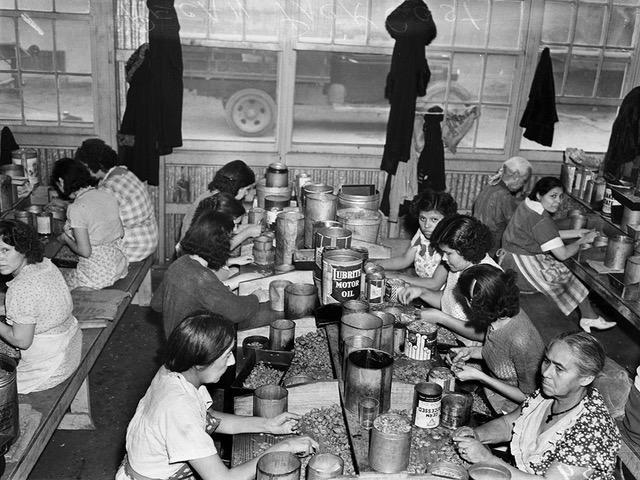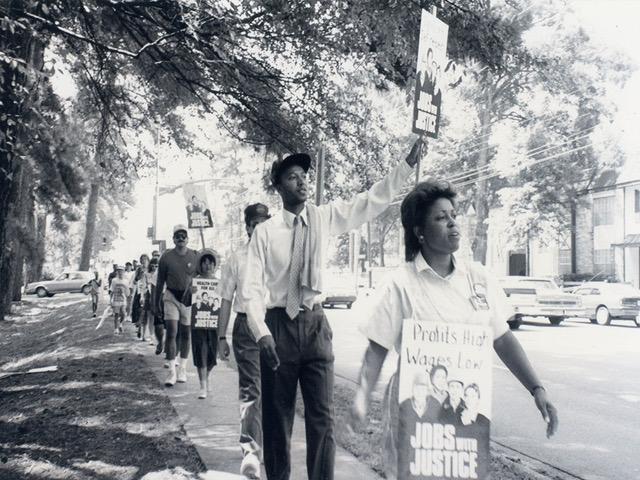
"A Strike and an Uprising (in Texas)" is an experimental documentary based in the telling of two events: the San Antonio pecan shellers’ strike of 1938 (above) and the Jobs with Justice march led by Nacogdoches cafeteria workers, groundskeepers and housekeepers in 1987 (below). Director Anne Lewis and Associate Producer Laura Varela will be in attendance at the film festival. Photos courtesy of Deborah Charnes
Talom Aptzai Film Festival
After 25 years of advocating and promoting the culture and traditions of indigenous peoples of San Antonio and beyond, American Indians in Texas (AIT) has teamed up with local filmmaker Scott Pewenofkit to bring a new film festival to Central Texas.
With the intention of re-adjusting mindsets, and honoring accurate, sensitive and thought-provoking films, American Indians in Texas is hosting a free Native American film festival.
The Talom Aptzai Film Festival will take place Sunday, Aug. 25 from 12- 9 p.m. at the historic Guadalupe Theatre, 1301 W. Guadalupe St. in San Antonio.
“Talom Aptzai” comes from the Pajalate language, a language of the Coahuiltecan, meaning “ancient fire.” It refers to the custom of gathering around the fire to share stories among family and community. And according to festival organizers, that’s exactly what the festival is designed to do; create platforms for discussion through more than six hours of shorts, documentaries and feature films.
Scott Pewenofkit is the festival curator. He is a San Antonio-based filmmaker that has been lending his talents to American Indians in Texas’ Making the Invisible Visible and Native Vote campaigns, for the last two years. As a member of the Kiowa tribe from Oklahoma, Pewenofkit’s interest in Native film “comes from a love of filmmaking and its ability to enrich our view of people and the world.” Over the last several years, he has explored the use of media as a means to give an artistic voice to indigenous people, which he says is still rare in the film industry. That’s why he was intrigued by AIT’s concept to host a free film festival.
“Film can express cultural ideas, preserve them, and still connect with people in ways that no other art form can,” Pewenofkit said.
Among the topics explored, or re-addressed, in the films are cultural appropriation, addictions, gender dysphoria and gender stereotypes, forced family separations, social and health inequities, unjust labor practices and spirituality.
“The festival was curated to highlight the wide array of voices and types of movies that are part of Native cinema currently,” Pewenofkit said.
Among the settings for the movies are San Antonio, Alaska, New Mexico, Arizona, Canada and Mexico, but subjects broach shared experiences with cultures as distant as the Irish and Syrians.

To help generate discussion, the director and producer of one of the featured films, “A Strike and an Uprising (in Texas),” will open the floor to questions and answers. The film, which was a very personal one for its associate producer Laura Varela and director Anne Lewis covers systemic institutional racism. The film is in part, an oral history of the Latino pecan workers in San Antonio, and African-American university employees in Nacogdoches.
Other films in the lineup include: “Hipster Head Dress,” an ultra-short film that confronts cultural appropriation and everything that's wrong with hipsters in headdresses; “Ronnie BoDean,” that stars first-ever Native American Academy Award honoree Wes Studi playing a larger-than-life outlaw with a short fuse struggling to babysit his jailed neighbor's precocious kids; “Etlinisigu'niet (Bleed Down),” a short film that focuses on Canada’s injustices to indigenous peoples; and many others.
AIT works for the preservation and protection of the culture and traditions of the indigenous peoples of South Texas through outreach, economic development and legislative initiatives. AIT strives to strengthen and enhance the ties Native Americans have to the practices that are universal to indigenous people, building on them to educate and inform others of our presence and history. For more information, go to AIT's website.
The festival is made possible thanks to the support of the City of San Antonio’s Department of Arts and Culture, the Texas Commission on the Arts, the San Antonio Area Foundation, the Marguerite Casey Foundation and Southwest Airlines.











